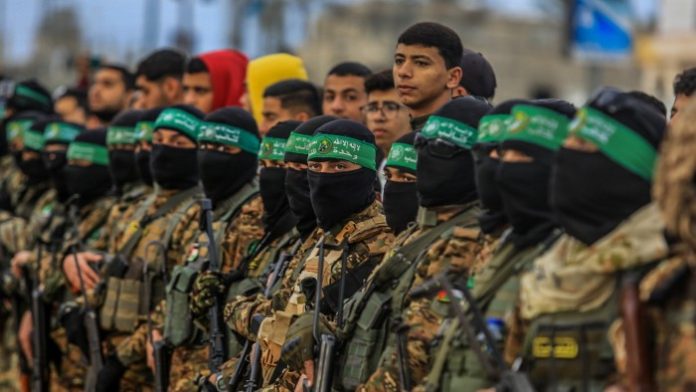Unlock the Editor’s Digest for free
Roula Khalaf, Editor of the FT, selects her favourite stories in this weekly newsletter.
Hamas on Monday said it was postponing the release of Israeli hostages planned for this Saturday “until further notice”, accusing Israel of not sticking to a complex ceasefire agreement between the two sides.
The move is the latest — and potentially most serious — in a series of disputes that have threatened the fragile deal, which took effect three weeks ago, halting the 15-month war between Israel and Hamas in Gaza.
Under the terms of the three-phase agreement, Hamas has been gradually freeing some of the Israeli hostages it holds in Gaza in exchange for the release of hundreds of Palestinian prisoners from Israeli jails.
However, while five exchanges have taken place, Hamas accused Israel of breaching various other aspects of the deal. It said Israel had delayed the return of Palestinians to north Gaza, opened fire in several areas and limited the entry of humanitarian aid into the shattered enclave.
The two sides have traded accusations of breaches of the agreement throughout the past three weeks, resulting in some exchanges being briefly delayed, but without ultimately derailing the deal.
Hamas added the postponement of the next hostage release would remain in place until Israel “complies with the agreement and compensates for the past weeks retroactively”.
Israel’s defence minister Israel Katz branded Hamas’s announcement a “complete violation of the ceasefire agreement”, and said he had ordered the Israeli military “to prepare at the highest level of alert for any possible scenario in Gaza and to protect the communities” of southern Israel.
In the first part of the agreement thrashed out by US-led mediators, Hamas was meant to release 33 Israeli hostages including all children, women and men over 50. By Saturday, it had released 21 of them in return for the release of more than 700 Palestinian prisoners. Hamas also released five Thai workers whom it also seized during the October 7 2023 attack on Israel that triggered the war.
The second stage of the deal, in which Hamas is meant to release all the remaining living hostages — in exchange for hundreds more Palestinian prisoners, a full Israeli withdrawal from Gaza and a permanent end to the fighting — is due to begin in March.
But negotiations have yet to begin on the details. Israeli Prime Minister Benjamin Netanyahu — under intense pressure from his far-right allies to resume the war when the first stage ends — last week said he would continue the fighting until Hamas was destroyed, casting doubt on the chances of the second stage taking effect.
The prospects of a longer-term deal have also been thrown into question by US President Donald Trump’s announcement that he wants the US to take over Gaza, and resettle its population of more than 2mn people elsewhere. The idea has provoked vehement opposition from Palestinians, the Arab world and much of the international community.
In an excerpt from an interview with Fox News due to be aired later on Monday, Trump said Palestinians who left under his plan would not have the right to return “because they’re going to have much better housing”. This contradicted US officials who had suggested their resettlement would be temporary.
“I’m talking about building a permanent place for them because if they have to return now . . . it’s not habitable,” he said. “Think of it as a real estate development for the future.”
He also repeated his assertion that he would persuade Egypt and Jordan to take in Palestinian refugees, something they have repeatedly ruled out.
Other western and Arab states have argued the Palestinian Authority — which exercises limited control in parts of the occupied West Bank — should take over the governance of Gaza once the war is over.
In a sign of the PA’s efforts to strengthen its international position, its president Mahmoud Abbas on Monday issued a decree overhauling a controversial system that paid benefits to the families of Palestinian prisoners, including those convicted of attacks that killed Israelis.
The US and Israel have long criticised the system, saying it rewarded violence against Israel, as payments were linked to the length of time a prisoner had spent in prison. Under the new system, benefits will be linked to families’ financial needs.




